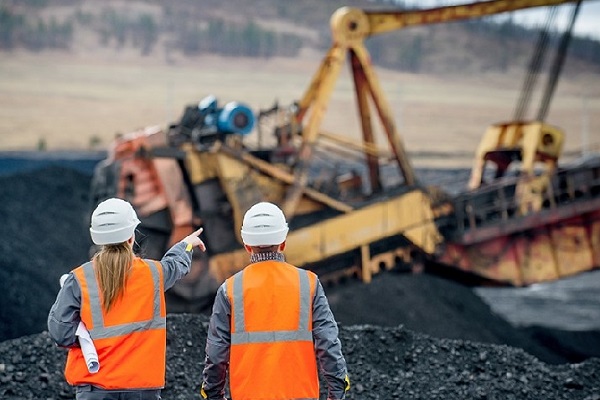
Capital investment of $5.4 trillion will be required to sustain and expand mining and processing facilities across the globe during the 2024-2035 period, a significant increase of $500 billion over the previous decade (2012-2023), said leading industry experts in a report released ahead of the Future Minerals Forum (FMF) in partnership with leading industry think tanks.
The fourth edition of the Future Minerals Forum will be held in Riyadh from January 14 to 16, 2025, under the theme “Delivering Impact”, drawing participation from high-level officials representing governments, mining companies, financial institutions, research centers, and universities.
The FMF experts in the 2024 Report: "Shaping the Future of Minerals" stated that more than 90% of the mass moved involves coal, iron ore, copper, and gold. And of this total capital, over 70% will be needed for these four commodities, with roughly 75% of it dedicated to sustaining existing assets.
The steel value chain alone is estimated to require about $1.6 trillion in sustaining capital expenditure, stated the FMF report offering critical insights into creating shared value across the mining ecosystem.
For some critical minerals, the mining phase is where most value is generated for countries: 70% of the value generated from cobalt is in mining; 68% for graphite; and 54% for lithium, it added.
The FMF report also pointed out that regions like Asia Pacific, India, Latin America, and Sub-Saharan Africa will require over 40% of total capital investment, reflecting a shift in capital flows to emerging markets.
Production of cathode materials, battery cells, and battery recycling could produce around $800 billion in annual revenue by 2040.
According to Ali Al Mutairi, Executive Director of FMF, the report provides authoritative content that tackles the tough issues facing the supply of minerals and aims to spark debate on the way forward at FMF in January 2025.
"The Super Region has significant untapped potential in minerals that can drive the global energy transition. However, the report shows that capital investment of $5.4 trillion will be required to sustain and expand global mining and processing facilities - nearly the equivalent to the combined GDP of Japan and Spain, noted Al Mutairi.
The report features insights from internationally recognized advocates for the minerals sector including Mark Cutifani, Chairman of Vale Base Metals, and Dr Michelle Foss, Fellow of Energy at the Baker Institute, as well as leading experts from CRU, Wood Mackenzie, Global AI, and Clareo-DPI.
In the report they explore the contribution of minerals to society, the value proposition of the sector for supplier countries, resource depletion and the need for significant investment to achieve development and the energy transition, the need for new forms of partnership to unlock funding, how the benefits of mining can be equitably shared with host countries and communities, addressing perceptions of mining that can reduce societal acceptance and hamper investment.
On building shared value propositions in the mining industries, Mark Cutifani said: "In the end, partnerships for shared, durable value creation and commitment to supporting commercial frameworks can go a long way toward meeting and exceeding key stakeholder expectations."
Addressing the vital role of collaboration, Principal Consultant at CRU Ionut Lazar said: "Collaboration across sectors is essential to meet global decarbonization targets – it cannot be achieved by a single entity. It is a global, multi-stakeholder challenge that requires strategic collaboration, especially if we want to move at pace and achieve the desired scale."
Patrick Barnes, the Head of Metals and Mining Consulting at Wood Mackenzie, said: "Value addition can provide countries with a range of well-known benefits: increased GDP, more fiscal revenue from a larger tax base, increased export earnings from higher-value products, and creation of direct and indirect jobs."
"But countries cannot afford to proceed blindly. Their plans have to take into account the real market dynamics, costs and benefits if they want to compete for investment and actually realize value," he stated.
For Co-Founder and Board Chair of Development Partner Institute and Board Chair of Clareo Peter Bryant, the role of government and industrial policy cannot be overstated.
"To date, the minerals industry has not prioritized shared prosperity effectively, resulting in a breakdown of trust with governments and local communities. However, the industry is at a turning point. Companies are taking on the responsibility of creating shared value, collaborating with new partners and at a deeper level. Government plays a key role in creating shared value by providing the springboards to investment and not being overly prescriptive," he added.
Dr. Michelle Michot Foss, fellow in energy and minerals, Baker Institute, Rice University, also emphasized the role of government in building shared value, stating: "While the mining industry can do much to help build and boost local and regional benefits, responsibilities lie with government jurisdictions to ensure that benefits linked to economic rents – revenue streams from taxes and royalties – are allocated in ways that build trust."
Global AI Corporation CEO Richard Rothenberg said: "As the demand for critical minerals continues to grow, policymakers and investors should prioritize sustainable practices, community engagement, and transparent governance to ensure long-term success and positive public perception."
The FMF report also highlights the importance of policies centered on GDP growth, job creation, and export enhancement as essential for countries aiming to boost value addition.-TradeArabia News Service
